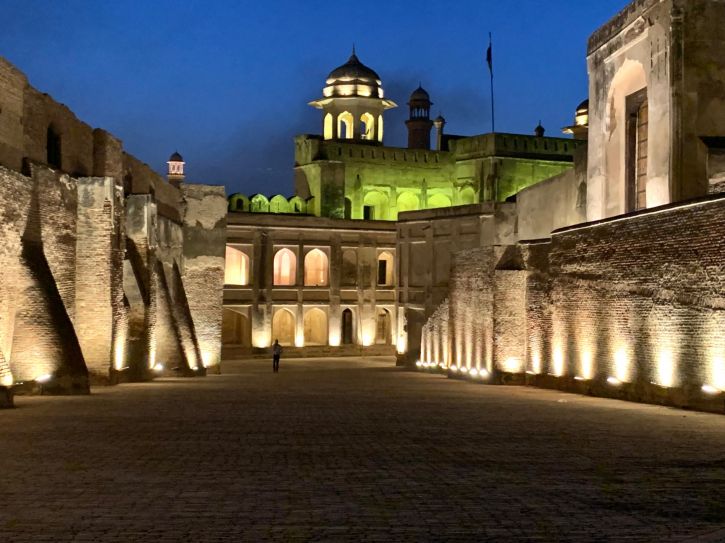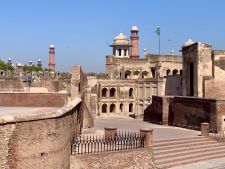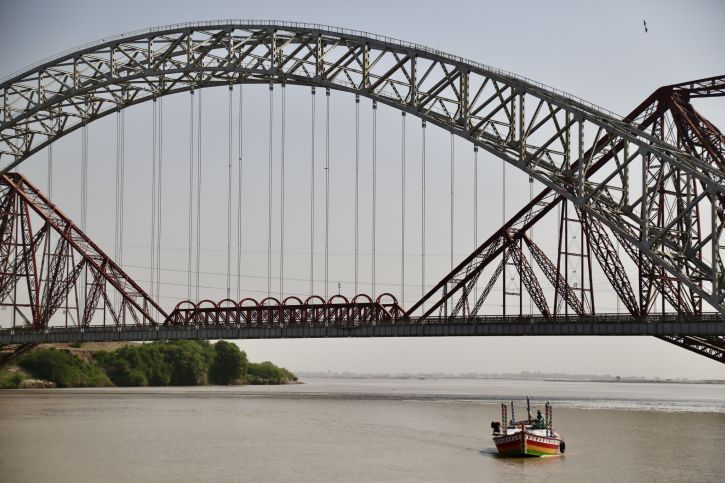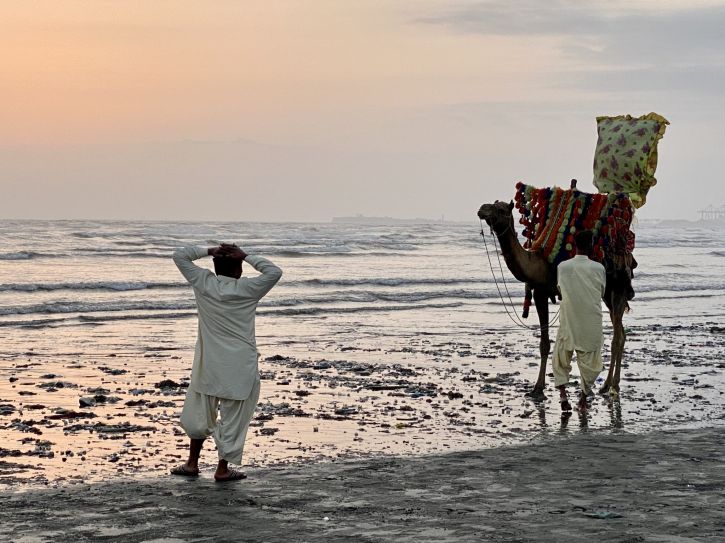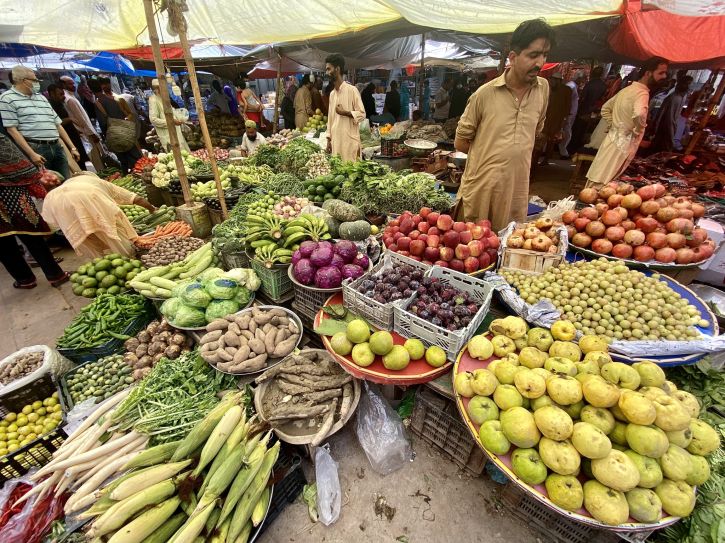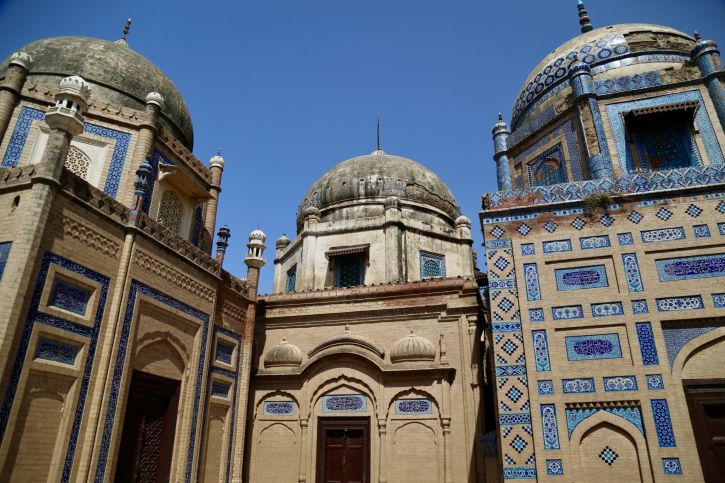This is the perfect Pakistan pairing with our spectacular tour of Northern Pakistan (JHPK, JHPF), or a fully-satisfying experience unto itself.
Prices below are per person, twin-sharing costs in US Dollars (USD). Pricing does not include airfare to/from the tour and any applicable taxes. For single supplement rates and taxes (if any), please refer to below Prices & Dates table. For general information on flights to/from the tour, click here.
Your Travel and Accommodation Arranged For You
Tips Included for Driver, Restaurant Staff, Local Guides
Authentic Local Experiences With Lots Of Inclusions.
Select a date below to reserve your spot:
Optional Single Supplement: $990 USD (number of singles limited).
This tour may require a mandatory single supplement charge of $990 if you join our share program and we are unable to pair you.
Download Itinerary
Day 1 Arrival in Lahore
Today we arrive in Lahore - welcome to Pakistan!
This evening we may/will likely be meeting travellers arriving from our Northern Pakistan tour (JKPK), some/most/all of whom will be joining us for the Southern section. For this short time in Lahore, our total group size owing to this overlap may exceed our usual maximum; however, this will be deftly managed with multiple vehicles and guides such that we won't feel "crowded" for our sightseeing and at meal times over the next two days.
Overnight in Lahore.
Included Meal(s): Dinner
Day 2 Lahore: Royal Bath, Lahore Fort & Badshahi Mosque
Today we explore Lahore.
We visit the Shahi Hamam and Walled City of Lahore, containing many buildings, bazaars, public spaces, and monuments of high cultural, architectural, and historic value. The Shahi Hammam is located inside Delhi Gate and provides an ideal context for welcoming visitors to the Walled City. In 2012, the Walled City Authority created an enabling environment for the restoration of the Shahi Hammam by removing commercial encroachments around the historic building.
Next is the Wazir Khan Mosque, located further inside the Walled City. The mosque was built in 1643 and is renowned for its use and execution of inlaid pottery decoration in the wall paneling. The Badshahi Mosque was built for the Emperior Aurangzeb in 1673-74 and is Lahore’s most striking building.
Modelled on the great Jami Masjid in Delhi, it has an impressive 20 meters high gateway and a central prayer chamber topped by three large white marble domes that open onto an enormous courtyard. It has space for 100,000 worshippers at a single time.
We also visit Lahore Fort, built by the Mughals during the their days of rule. The fort contains some of the most impressive secular Mughal buildings in South Asia. Embellished with carved red sandstones, marble, pietra dura work, glazed colored and Kashi tile works plus frescos depicting princely pleasures. It is more a "place" than just a fort.
Overnight in Lahore.
Included Meal(s): Breakfast and Dinner
Not finding what you're looking for?
Our specialists can take away the stress and create a private custom tour tailored to your exact interests and budget.
Day 3 Lahore: Lahore Museum, Shalimar Garden & Waga Border
After breakfast we visit Lahore Museum, Shalimar Garden, and the flag lowering ceremony at Wagah Border.
Lahore Museum is the oldest and best in Pakistan. The museum's first curator was John Lockwood Kipling, father of Rudyard Kipling who referred to the museum as the "Ajaib Ghar" or House of Wonders. The coin collection here is extremely valuable with some from the period of Alexander the Great.
Standing outside the museum is the famous Zam Zama Gun. Immortalized by Kipling in the opening lines of “Kim” this mighty cannon is so named because on firing it resembles a lion’s roar. The gun saw action in the Battle of Punjab 1761 and was badly damaged in the battle of Multan in 1818. It was subsequently retired to Lahore Fort, and finally moved to its present location in 1870.
We then visit the Shalimar Gardens, dating from the period when the Mughal Empire was at its artistic and aesthetic zenith. Laid out as a Persian paradise, it was intended to create a representation of an earthly utopia in which humans co-exist in perfect harmony with all elements of nature. In 1981 the Shalimar Gardens were inscribed as a UNESCO World Heritage Site as they embody Mughal garden design at the apogee of its development.
Finally we then witness the Flag Lowering Ceremony at Wagah Border, an interesting daily 'Beating Retreat' ceremony at Wagah border since 1959. Indian and Pakistani security forces jointly drill a very seriously provocative parade, imbued with humour and drama. The ceremony starts with a blustering parade by the soldiers from both sides and ends up with the perfectly coordinated lowering of two nations' flags. Flags are folded and the ceremony ends with a retreat that involves abrupt handshakes between the soldiers of each side followed by the closing of the gates.
Overnight in Lahore.
Included Meal(s): Breakfast and Dinner
Day 4 Lahore - Harappa - Multan
After breakfast we embark on our drive to Multan. En route we visit the second most famous ancient city of the Indus valley civilization, Harappa. The morning drive to Harappa will take approximately 4 hours.
Harappa is an ancient city located in present-day Pakistan that was once the centre of the Indus Valley Civilization, one of the world's earliest urban civilizations. The city was inhabited around 2600 BCE and is considered one of the most important archaeological sites in South Asia. The city's sophisticated urban planning, advanced sanitation system, and impressive architecture provide insight into the complex society that once existed there. The remains of Harappa show evidence of a highly organized city, with structures made of baked bricks, public baths, and an extensive drainage system. The civilization's writing system, which has yet to be deciphered, was also discovered at the site. Harappa's significance lies not only in its impressive urban planning and architectural feats but also in the insights it provides into the culture and daily life of the ancient Indus Valley Civilization.
During our time at Harappa we will tour the site and visit the local archaeological museum.
After lunch and our visit we continue driving towards Multan (approximately a 3 hour drive). If we have enough time on this day we will stop en route at a factory that produces the famous blue pottery of Multan (otherwise we will visit the next day).
Overnight in Multan.
Included Meal(s): Breakfast, Lunch and Dinner
Day 5 Multan Sightseeing
We have a full day to explore Multan, the city of Saints.
The city dates back over 5,000 years and is believed to have been one of the earliest human settlements in the world. The city is known for its rich cultural heritage, ancient monuments, and exquisite handicrafts. Multan is also known as the "City of Sufis" due to its many Sufi shrines, which attract devotees from around the world. The city's most famous landmarks include the historic Multan Fort, the beautiful Mausoleum of Shah Rukn-e-Alam, and the intricately designed tombs of the Sufi saints Hazrat Bahauddin Zakariya and Shah Shams Tabrez. Multan is also renowned for its production of high-quality textiles, pottery, and handicrafts, which are popular both locally and internationally. We begin our tour with a visit to the famous Sufi shrines. Afterwards we will visit the Hussain Agahi Bazaar, a huge market full of local colour.
Overnight in Multan.
Included Meal(s): Breakfast, Lunch and Dinner
Day 6 Multan - Bahawalpur
After breakfast, we begin our drive to the city of Bahawalpur (approximately a 2 hour drive). The city was founded in the 18th century and is known for its rich cultural heritage, stunning architecture, and beautiful landscapes. The city's most famous landmark is the Bahawalpur Palace, also known as the "Sadiq Garh Palace," which was built in the 19th century and is one of the largest palaces in Pakistan. Unfortunately, the palace is operated by the Pakistan military and is usually not open to the public for viewing.
Upon arrival we will visit the famous Library of Bahawalpur, a historic institution located in the heart of the city. The library was established in 1924 by the Nawab of Bahawalpur, Sir Sadiq Muhammad Khan V, and was initially housed in a small room in the city's Victoria Hospital. Today, the library is housed in a beautiful building constructed in the colonial style and is home to over 200,000 books, including rare manuscripts and documents dating back several centuries. The library is renowned for its collection of books on Islamic history and culture, including rare copies of the Quran and other important Islamic texts. The library also boasts a large collection of English and Urdu literature, as well as books on science, history, and philosophy. The Library of Bahawalpur is not only a treasure trove of knowledge and information but also a stunning example of colonial architecture, making it a must-visit destination for anyone interested in the history and culture of Pakistan.
Overnight in Bahawalpur.
Included Meal(s): Breakfast, Lunch and Dinner
Day 7 Bahawalpur Area Touring
After breakfast we will drive to Derawar Fort (+/- 2 hours) at the edge of Cholistan Desert (an extension of the Thar Desert - the largest desert in the subcontinent). Derawar Fort is a massive historical structure. The fort was built in the 9th century by the Bhatti Rajput dynasty and is a stunning example of desert architecture. The fort is surrounded by a 30-meter-high wall with 40 bastions, making it an imposing sight against the backdrop of the desert. The fort has been home to several different rulers over the centuries, including the Nawabs of Bahawalpur, who added several new structures to the fort in the 18th and 19th centuries. Today, the fort is a popular tourist destination and has been used in several films and television shows in Pakistan. The fort area is also home to several important Sufi shrines, including the Tomb of Derawar's 7 Saints, which is visited by thousands of devotees every year. While we are here, we will visit the fort, the nearby mosque, and the intricately designed mausoleums located at the necropolis of the Abbasi Nawabs.
After lunch and our visit to the sites, we will return to Bahawalpur for the night.
Overnight in Bahawalpur.
Included Meal(s): Breakfast, Lunch and Dinner
Day 8 Bahawalpur - Sukkur
After breakfast, we begin our drive to Sukkur. On the way, we will stop at the city of Uch Sharif (+/- 1.5 hours), an ancient town located in the southern region of the Punjab region. The town is known for its rich cultural heritage and historic landmarks, including several important Sufi shrines. The town dates back over 5,000 years and was once an important centre of learning and commerce. Today, Uch Sharif is home to several important landmarks, including the Shrine of Bibi Jawindi, a Sufi saint. Bibi Jawindi was the great-granddaughter of another famous Sufi saint, Sheikh Bahauddin Zakariya. The shrine was built in the 14th century and is considered one of the finest examples of Islamic architecture in Pakistan. The shrine's exterior is decorated with intricate tile work and calligraphy, while the interior is adorned with stunning frescoes and carvings. The shrine is a popular pilgrimage site for Sufi devotees from around the world, who come to pay their respects to Bibi Jawindi and seek blessings for themselves and their families.
The town is also home to the Tomb of Jalaluddin Bukhari, which is believed to be the oldest monument in Uch Sharif and is a testament to the town's ancient history.
We then continue onward to the city of Sukkur (+/- 4 hours). The city is home to several important landmarks, including the Tomb of Seven Sisters and the Lansdowne Bridge, which is considered one of the longest surviving British colonial-era bridges in the world. Sukkur is also renowned for its handicrafts, including pottery, textiles, and leather goods, which are sold in the city's markets.
In the late afternoon we will visit the famous Hindu pilgrimage centre of the Tomb of the Seven Sisters. The tomb is believed to be the final resting place of seven sisters who were martyred for their faith during the reign of Mughal emperor Aurangzeb. The sisters belonged to a wealthy Hindu family and refused to convert to Islam, even when faced with persecution and death. The tomb was built in the 18th century and is a stunning example of Mughal architecture. The tomb's exterior is decorated with intricate tile work and calligraphy, while the interior is adorned with beautiful frescoes and carvings. The Tomb of Seven Sisters is a popular pilgrimage site for Hindus and Muslims alike, who come to pay their respects to the martyred sisters and seek blessings for themselves and their families.
From nearby the tomb, we will hop aboard a traditional Indus River boat for a short ride on the river to enjoy sunset and also to get an opportunity to spot the river dolphins that are often seen frequenting the area.
Overnight in Sukkur.
Included Meal(s): Breakfast, Lunch and Dinner
Day 9 Sukkur - Mohenjo-Daro - Larkana
After breakfast we drive to Kot Diji archaeological site and fort (+/- 1 hour). This site stands on one of the rare outcroppings of limestone that are part of the Rohri Hills to the north. The site, which dates from 3500 to 2500 BC, has two distinct parts to the site. Excavation of the upper level revealed pottery of the Harappan civilization, while the lower levels exposed evidence of an unknown pre-Harappan culture, designated as Kot Deji. On top sits the historic fort and this dates back to the 18th century. The fort is surrounded by a 25-meter-high wall with 5 bastions and features beautiful gardens, ornate carvings, and intricate tile work. The fort was built by Mir Sohrab Khan Talpur, who was the ruler of the Khairpur State, and served as a strategic defence fortification against invading forces. The fort has several important landmarks, including the Darbar Hall, which is adorned with beautiful frescoes and carvings, and the Shish Mahal, which is a stunning example of Mughal architecture.
Afterwards we continue by bus to one of the true highlights of the tour - the famous archaeological site of Mohenjo-Daro. This incredible site dates back over 4,500 years and is one of the world's earliest urban settlements. The city was an important centre of the Indus Valley Civilization, which flourished between 2600 BCE and 1900 BCE, and is renowned for its advanced urban planning, sophisticated drainage systems, and impressive architecture. The ruins of Mohenjo-daro include several important landmarks, including the Great Bath, which is a large public bathing pool, and the Granary, which is believed to have been used for storing crops. The city's unique architecture and advanced urban planning provide insight into the complex society that once existed there. The city is also renowned for its exquisite handicrafts, including pottery, jewelry, and textiles, which were produced by the skilled craftsmen who once resided there. Mohenjo-daro is not only a testament to the rich cultural heritage of Pakistan but also a symbol of the ingenuity and creativity of the people who built it.
We depart Mohenjo-Daro in the late afternoon for Larkana, our overnight stop.
Overnight in Larkana.
Included Meal(s): Breakfast, Lunch and Dinner
Day 10 Larkana - Hyderabad
After breakfast we drive on the Indus highway towards Hyderabad via the city of Sehwan Sharif (+/- 3 hours) where we will visit the famous Sufi shrine of 12th AD Lal Shahbaz Qalander. The shrine is dedicated to the Sufi saint Lal Shahbaz Qalandar, who was a renowned poet, philosopher, and musician, and is considered one of the most important Sufi saints in South Asia. The shrine was built in the 14th century and is a superlative example of Islamic architecture. The shrine's exterior is decorated with intricate tile work and calligraphy, while the interior is adorned with beautiful frescoes and carvings. The shrine is a popular pilgrimage site for Sufi devotees from around the world, who come to pay their respects to Lal Shahbaz Qalandar and seek blessings for themselves and their families. The shrine is also well-known for its vibrant atmosphere, with music, dance, and poetry recitals taking place throughout the day and night.
We continue on our way to Hyderabad (+/- 2 hours). The city is home to over 6 million people and is the second largest city in Sindh province. The city is renowned for its delicious cuisine, which features a mix of Pakistani, Indian, and Persian influences, and is best enjoyed in the city's many traditional restaurants.
Overnight in Hyderabad.
Included Meal(s): Breakfast, Lunch and Dinner
Day 11 Hydarabad - Thatta - Makili - Chokundi - Karachi
We depart after breakfast on our drive toward the city of Thatta (+/- 2 hours) to visit the famous Shah Jahan mosque, one of the most beautiful and significant mosques in the country. The mosque was built in the 17th century by Mughal emperor Shah Jahan and features a beautiful facade adorned with intricate tile work and calligraphy, while the interior is decorated with beautiful frescoes and carvings. The mosque is a popular pilgrimage site for Muslims from around the world, who come to pray and seek blessings. Thatta is also home to several other important landmarks, including the Makli Necropolis, which is one of the largest and most impressive cemeteries in the world, and the historic Keenjhar Lake, which is believed to have been the site of a romantic encounter between the Sindhi prince Noor Muhammad and the beautiful Sohni.
During our time here, we will visit the Shah Jahan mosque, explore the Makli Necropolis, and take in the views at Kanjur Lake before we continue on the way to Karachi (approximately 2 hour drive).
Overnight in Karachi.
Included Meal(s): Breakfast, Lunch and Dinner
Day 12 Karachi: City Tour
Karachi is the largest and most populous city in Pakistan, located in the southern province of Sindh. It is a pulsating mega-city with a rich cultural heritage and a diverse population, reflecting the city's long history as a centre of trade and commerce. Our full day visit of Karachi will begin with the Mausoleum of Muhammad Ali Jinnah, the founder of Pakistan. We then continue to the National Museum of Pakistan with its numerous fascinating galleries. The museum features a multitude of artifacts including objects from the pre- and proto-history of the region (5000 to 1500 BC). After lunch, we will tour the Mohatta Palace Museum near Clifton Beach, where there are always unique collections of art and textiles on display. The Mohatta Palace was built in 1927 by Shivratan Chandraratan Mohatta, a Hindu Marwari merchant from modern-day Rajasthan in India. After partition, the palace became the property of the state and initially housed Pakistan’s foreign affairs office when Karachi was the capital of Pakistan. After the capital was moved to Islamabad, the palace became the private residence of Fatima Jinnah, a Pakistani dental surgeon and political leader and one of the founders of Pakistan. Later,on the Sindh government converted it into a museum and meticulously restored it to its former glory. If time permits we will also visit the Saddar Bazaar (Empress Market).
To wrap up our tour of Karachi and South Pakistan, we will make our way to Clifton Beach to watch the sunset over the Indian Ocean. Afterwards we will return to our hotel and enjoy our farewell dinner.
Overnight in Karachi.
Included Meal(s): Breakfast, Lunch and Dinner
Day 13 Departure
Departure from Karachi.
SAFE TRAVELS!
Included Meal(s): Breakfast
Inclusions
Hotel breakfast included daily; all dinners and most lunches are included on all full touring days. Bottled water will be provided at lunch and dinner, as well as on the road throughout the day.
All transport; accommodation, sightseeing and entrance fees for sites noted as 'visited' in the detailed itinerary. Services of a full-time Adventures Abroad Tour Leader and local English-speaking step-on guides at several locations on our route.
Gratuities for drivers, restaurant/hotel staff, porters, local guides.
Airport transfers for land & air customers. If you extend your stay pre- or post-tour, we will include your airport transfers if you book both your air and extra nights through us. We also include your 'Letter of Invitation' required to apply for your visas (see "Exclusions").
Exclusions
International airfare to/from the tour.
Tour Leader gratuities, personal items (phone, laundry, etc), additional beverages, any meals not listed in the itinerary, international (if applicable) air taxes, visa fees (see below), and any excursions referenced as 'optional'.
Airport transfers for Land Only customers (available for purchase). Optional trip cancellation insurance (strongly recommended). Our post-reservation trip notes offer further guidance on visas, any not included meals, money matters, what to bring, etc.
Visas: A tourist visa is required to travel to Pakistan, which is not included in the cost of your tour. This must be obtained in advance of your arrival and can be acquired online (Canadian, USA, UK passports). We will provide you with a 'Letter of Invitation' to assist you in applying for your visa (included). More information will be provided in your pre-departure notes emailed at time of reservation.
Seasonality and Weather
Pakistan’s climate is difficult to pin down as a single entity. It ranges from tropical and subtropical to semi-arid and desert, and then up north you’ve got the ridiculously beautiful – and ridiculously cold – mountainous areas incorporating the Karakoram, Himalaya, and Hindu Kush ranges.
As this tour occurs in the south and at low altitude, we can expect warm, almost summer-like conditions, though the extreme heat of summer will be well-passed.
October is the also the month when autumn arrives, bringing with it a vibrant palette of leaf colour and slopes high above covered in snow, making this a very picturesque season in the region.
Transport and Travel Conditions
As this tour occurs at low altitudes and features good roads and mostly level surfaces, we list this trip among our "Level 1" tours according to our 3-level difficultly rating system. That said, we visit some sites that are large and feature walking tours of towns, cities, markets etc. We may also have some short walks to//from dinner. Your must also be mindful of the possibility of heat on some days, and the fact that this is an ambitious program with some full days of travel and sightseeing.
Baggage handling is available/included at hotels.
Safety: Pakistan is one of those countries that sets off alarm bells in the minds of friends and family. Their reaction is understandable given the news coverage of Pakistan over the past 20 years, and there's no doubt that some areas that should be avoided. That said, you can rest assured that we would not take you anywhere unless we were convinced it was safe. There's much more to Pakistan than the media might lead you to believe.
Am I suitable for this tour? Please refer to our self-assessment form.
Activity Level: 1
No particular physical activity is involved other than town/city walks and short walks to dinners and sites of interest, some of which are large.
To learn more about the Activity levels, please visit our tour styles page.
Accommodation
All accommodation in the south of Pakistan are modern 3-4 star properties with all of the comforts and conveniences one might find at any international hotel of this standard.
For full details, please click on the "Map & Hotels" tab elsewhere on this page.
Staff and Support
Your full time Tour Leader will be assisted by a team of drivers (including a "senior driver" who will also act as a guide); and possibly local guides at some locations. For 2024, leadership is on a TBA basis.
Group Size
Maximum 18 travellers plus Tour Leader
Tour Extensions
This tour is part of a series that can be upgraded to make for a longer trip. For more options, please refer to tour code/s:
Tour Overview Countries Visited: 1 Acivity Level: 2 Tour Style: Cultural
Pakistan. An entity formed from the partition of British India along religious lines. The name may evoke many images and stereotypes based on recent news headlines, but this tour aims to dig under the surface and reveal the wonders of this fascinating and vibrant nation.
Our focus is in the north of the country where multiple tales of the 19th century Great Game between the expanding Russian empire and the British Raj played out over control of the lands here in Central and South Asia.
Our tour embarks on an exploration of the capital, Islamabad, before setting off for the mountains of the Himalaya, the Karakorum Highway, and Hindu Kush. Ancient towns and villages lie ahead with discoveries of the old forts and dramatic scenery of the mountains. Highlights include the Hunza Valley, Gilgit, Skardu, and Shigar, all important stops on the ancient Silk Road.
Our tour concludes in the city of Lahore, home to the Lahore Fort, the Shalimar Garden, and the famous flag lowering ceremony at the Line of Control between India and Pakistan.
Tour Overview Countries Visited: 1 Acivity Level: 2 Tour Style: Cultural
Our full tour of Pakistan combines the splendour of the mountains in the north of the country with the vital cultural and historical sites found in the south. Together, this makes for the most comprehensive tour of Pakistan you could wish for! Led by a senior tour leader and hosted by our outstanding local partners, this tour will make this a truly remarkable travel experience in this off-the-beaten-track destination.
Regions visited: South Asia
Countries visited: Pakistan
*The red tour trail on the map does not represent the actual travel path.
The following is a list of sample hotels at some locations included on this tour. The hotels shown here are meant to provide a general sense of the standard of hotel we usually aim for; they are not necessarily confirmed for your chosen departure.
















Sambara Inn provides an outdoor swimming pool ... free WiFi. Among the various facilities are a garden, a terrace, as well as a shared lounge. The property has a restaurant. At the hotel, all rooms come with a desk. With a private bathroom equipped with a shower and free toiletries, rooms at Sambara Inn also feature a pool view.








Tourcode: JHSP
